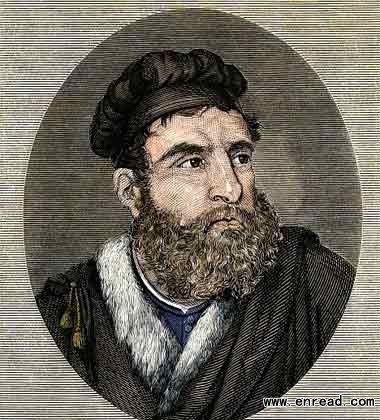| ||||||||||||||||||||||||||||||||||||||||
|
One of history’s greatest explorers, may in fact have been a conman, it was claimed yesterday. 昨日有消息称,历史上最伟大的探险家之一可能事实上是个大骗子。  Travelling trickster? Marco Polo may have fabricated his experiences by using other people's stories. They suspect the Venetian adventurer picked up stories about the mysterious lands of the Orient from fellow traders around the Black Sea who related tales of China, Japan and the Mongol Empire in the 13th century. He then put the stories together in a book commonly called The Travels of Marco Polo, hailed as one of the first travel books; it purports1(声称) to be his account of his journeys through Persia, Asia and the Far East between 1271 and 1291. It details his relations with Kublai Khan, the Mongol ruler who became Emperor of China. But now an Italian team of archaeologists studying in Japan have cast doubts about one of Italy’s great national heroes -- although there have been competing claims to him from Croatia, which argues he was born there. The doubters told Italian history magazine Focus Storia that there were numerous inconsistencies(不一致) and inaccuracies in Marco Polo’s description of Kublai Khan’s attempted invasions of Japan in 1274 and 1281. 'He confuses the two, mixing up details about the first expedition with those of the second. 'In his account of the first invasion, he describes the fleet leaving Korea and being hit by a typhoon before it reached the Japanese coast,' said Professor Daniele Petrella of the University of Naples, the leader of the archaeology2 team. 'But that happened in 1281 – is it really possible that a supposed eye witness could confuse events which were seven years apart?' He said that Polo’s description of the Mongol fleet did not square with the remains3 of ships that the team had excavated4 in Japan, as he had written of ships with five masts, while those which had been found had only three. 'When he describes Kublai Khan’s fleet he talks about the pitch that was used to make ships’ hulls5 watertight. He used the word 'chunam’, which in Chinese and Mongol means nothing. 'In fact, it is the Persian word for pitch. It’s also odd that instead of using, as he does in most instances, local names to describe places, he used Persian terms for Mongol and Chinese place names.' The explorer claimed to have worked as an emissary(使者,间谍) to the court of Kublai Khan, but his name does not crop up in any of the surviving Mongol or Chinese records. 点击  收听单词发音 收听单词发音
|
||||||||||||||||||||||||||||||||||||||||
上一篇:《绝望主妇》将于明年完美谢幕 下一篇:每天15分钟的运动即可延年益寿 |
||||||||||||||||||||||||||||||||||||||||
- 发表评论
-
- 最新评论 进入详细评论页>>



